Exploring tarot questions to ask about yourself can open a window to your inner world and help guide your personal growth. With the right mindset, tarot can become a powerful tool for introspection and self-discovery. By asking insightful questions, you unlock deeper self-awareness and the potential for transformation.
When you engage with tarot cards, you’re setting the stage to learn more about your own thoughts and feelings. These questions can focus on any aspect of life, from relationships to personal challenges. Through thoughtful reflection, you might recognize patterns or gain clarity that you hadn’t noticed before.
Remember that your journey with tarot is a personal one, allowing you to delve into self-reflection at your own pace. Each reading can offer guidance and reveal the wisdom within you waiting to be acknowledged.
Key Takeaways
- Engage with tarot for self-discovery and growth.
- Insightful questions enhance personal reflection.
- Tarot unlocks deeper self-awareness and transformation.
Setting Your Intentions
When preparing for a tarot reading about yourself, it’s important to set clear intentions. This process involves focusing on areas like personal growth or professional aims. Identifying these focuses helps you gain clearer insights from your reading.
Before diving into a reading, the first thing is to clarify your goals and own needs. A clear intention will guide your tarot practice in the right direction and lead to an accurate tarot reading. Whether you’re exploring a new tarot deck or working with an experienced tarot card reader, your focus shapes the reading’s energy.
Identifying Personal Growth Areas
Think about your life purpose and what personal areas you wish to develop. This can include aspects like spiritual growth, relationships, or self-care practices. Consider where you feel most challenged and what you hope to change or improve on. Reflecting on these areas will aid in formulating questions that align with your own personal journey. This alignment with your true self helps enhance the connection with the tarot. Use this time to center and calm yourself, building a bridge between your conscious mind and deeper insights.
Professional Goals and Career Path
Setting intentions for your professional life entails focusing on your career path. Consider what goals you want to achieve, such as advancing in your current role or exploring new fields. Reflect on what truly fulfills you and if your current position aligns with your values and life purpose. Formulate questions that address specific career goals or challenges you face. Structure these questions to gain guidance and clarity on your professional development. This mindful approach helps in making informed decisions that are in tune with your ambitions.
Understanding Tarot Questions
When exploring tarot questions, it’s crucial to consider the nature of the questions you ask. Your approach can significantly influence the insights you receive.
Tarot card readings are a great way to gain insights about yourself, but the type of questions you ask is the most important thing. Avoid wrong questions that seek specific outcomes, and instead, focus on effective tarot questions that are open-ended and invite reflection. The best way to approach tarot is by seeking the deeper meaning behind situations, allowing for self-improvement and personal development.
Types of Questions
When using tarot, the type of question you ask plays a major role in the experience. Specific questions can help target particular areas of your life, such as your career or relationships. These questions often generate focused, clear responses that can guide your decisions.
In contrast, general questions allow for broader interpretations. These questions can be beneficial when you’re seeking an overview or exploring multiple facets of your situation. Choosing the right questions ultimately depends on your objective and what you hope to gain from the reading.
The Power of Open-Ended Questions
Open-ended questions are a valuable tool in tarot reading, encouraging more detailed and nuanced insights. These questions invite expansive responses, rather than simple yes or no answers, which helps uncover deeper understanding. Questions beginning with “how” or “what” are particularly effective.
By avoiding close-ended questions, you invite the tarot to reveal complexities and hidden truths. For example, asking “How can I improve my personal growth?” is more enlightening than a yes/no inquiry. Embrace the exploratory nature of open-ended questions to gain a richer, more meaningful tarot experience.
Asking About Relationships
When it comes to relationships, tarot cards can offer clarity and insight. You can explore your love life or examine the dynamics between friends and family. Avoid yes/no questions; focus on framing questions that target your actions and feelings.
When it comes to relationships, love readings are a great way to explore connections and emotional growth. The best questions are those that invite exploration, such as “What role do I play in this dynamic?” or “How can I foster better communication?” Avoid specific outcomes and focus instead on understanding yourself within the relationship.
Exploring Love Life
Inquiring about your love life through tarot can help you understand your current relationship better or gain insights into new romantic possibilities. Questions like “What energies surround my current relationship?” may reveal your partner’s priorities and mutual understanding.
For those navigating a love triangle, questions like “What should I focus on to make an informed choice?” can offer valuable guidance. A love reading might highlight aspects you’ve overlooked, fostering clarity on how to proceed or what to expect next.
Exploring Love Life: 30 Tarot Questions to Ask About Yourself
- What do I believe love should feel like—and is that belief helping me?
- How open is my heart to giving and receiving love right now?
- What emotional baggage am I bringing into my current or future relationship?
- What patterns do I repeat in relationships that no longer serve me?
- How do I define intimacy, and do I allow it into my life?
- What kind of partner would complement my current personal growth?
- Am I seeking love from a place of wholeness or from a sense of lack?
- What old wounds are shaping my love expectations?
- What is my love language, and how do I express it?
- How do I self-sabotage in romantic connections?
- What kind of love story am I trying to create—and why?
- What role does fantasy or idealization play in my love life?
- What parts of myself do I hide in relationships?
- What fear do I have about being truly seen by a partner?
- What is my deepest romantic desire?
- Am I afraid of being alone, or do I truly want a partnership?
- How can I balance independence and connection in love?
- How do I handle emotional conflict with someone I care about?
- What’s something from a past relationship that still lives in my heart?
- In what ways am I more ready for love now than ever before?
- What does a healthy romantic relationship look like to me?
- What do I need to unlearn about love?
- What do I truly crave in a soul-deep partnership?
- How can I be more emotionally honest with a romantic partner?
- How do I express affection, and is it being received?
- How do I react when love challenges me to grow?
- What does emotional safety look like in a relationship?
- How do I distinguish between attraction, attachment, and alignment?
- What would I tell my past self about love?
- What am I now ready to release to call in the love I deserve?
Family and Friends Dynamics
Tarot can also help in assessing family members’ roles and the balance in your friendships. Consider questions like “How can I improve my relationship with my family members?” or “What should I know about my current friendship dynamics?”
These can provide insights into unresolved tensions or supportive bonds. When conflict arises, cards may indicate areas of communication to focus on. Family dynamics can be complex, and tarot can serve as a tool to explore these intricate aspects, offering clarity on your place within these vital connections.
Family and Friends Dynamics: 30 Tarot Questions to Ask About Yourself
- What is my current role within my family, and how do I feel about it?
- How do I show up for the people I care about—and is it sustainable?
- What boundary do I need to set with a family member or close friend?
- What relationship in my life currently needs healing or attention?
- How can I support my loved ones without losing connection to myself?
- What unconscious family patterns might I be repeating?
- What lesson am I learning through a current friendship or conflict?
- Do I feel seen and understood by the people closest to me?
- What do I need to communicate more clearly with my loved ones?
- How has my upbringing shaped the way I relate to others?
- Where do I feel emotionally safe in my relationships—and where do I not?
- How do I handle disappointment in close relationships?
- Who in my life drains my energy, and why do I allow it?
- How do I navigate guilt or obligation within my family structure?
- What relationships have I outgrown, and why is it hard to let them go?
- What do I most appreciate about my support system?
- How do I handle vulnerability within my friendships?
- What role does loyalty play in my closest bonds?
- What triggers me in my family relationships—and what’s the deeper root?
- How can I bring more honesty and compassion into my social circle?
- What childhood relationship still affects me today?
- In what ways do I feel emotionally responsible for others?
- What makes me feel emotionally fulfilled in my friendships?
- What friend or family member mirrors something I need to heal in myself?
- Am I giving more than I’m receiving in any current relationship?
- What do I need to forgive a loved one—or myself—for?
- How has loss or distance shaped my relationships over time?
- How do I cope when people I care about disappoint me?
- What belief about friendship or family am I ready to challenge?
- What kind of relationships do I want to intentionally cultivate moving forward?
Pin it for later! ⤵️
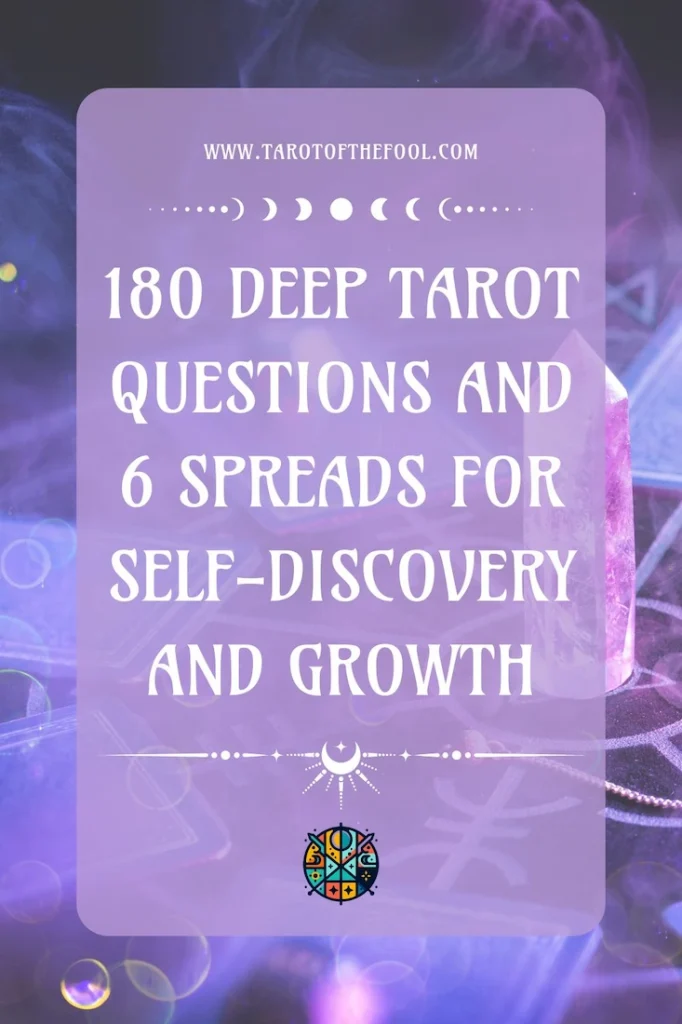
Encountering life’s challenges can be daunting, but when approached with intention and insight, tarot can provide valuable guidance. Through focused questions, you can tackle challenging times and gain clarity on the right path for your future.
Tarot can help you navigate challenges by asking important questions about how to move beyond your comfort zone. Good questions include “What is blocking my progress?” or “What support do I need right now?” This approach empowers your free will and ensures the reading offers guidance rather than definitive answers.
Tackling Difficult Times
During difficult times, it’s common to feel stuck or overwhelmed. By using tarot, you can gain a fresh perspective on your current situation. Ask questions like, “What can I learn from this struggle?” or “How can I overcome this obstacle?” Such queries help you uncover hidden strengths and new possibilities.
Focus on understanding what these challenges reveal about your present moment. They might highlight patterns that need breaking or inspire you to consider new approaches. Take time to interpret each card thoughtfully. The insights you gain can be profound, offering solace and practical paths forward.
Tackling Difficult Times and Life Challenges: 30 Tarot Questions to Ask About Yourself
- What inner strength can I lean on during this difficult time?
- What lesson is this challenge here to teach me?
- How can I respond to this situation with more self-compassion?
- What part of me is being tested or stretched right now?
- How can I hold space for both struggle and growth?
- What belief am I being asked to let go of in this hardship?
- How do I typically react to discomfort, and is that serving me?
- What emotional truth am I avoiding as I go through this challenge?
- What support system or tool can help me carry this burden?
- What has helped me overcome difficult times in the past?
- What pain am I holding onto that needs to be released?
- How can I stop resisting the reality of this situation?
- What boundary do I need to set to protect my energy right now?
- How can I be more present even when life feels overwhelming?
- What is one small, empowering action I can take today?
- What fear is being triggered by this experience?
- How can I transform this pain into wisdom or resilience?
- What truth have I been avoiding that this situation is now revealing?
- How can I stay connected to my purpose in the midst of this difficulty?
- What story am I telling myself about this hardship—and is it accurate?
- What part of me feels most vulnerable right now?
- How can I ask for help without feeling guilty or ashamed?
- What mindset shift would help me cope more gracefully with this challenge?
- What is this situation reflecting about my relationship with control?
- What would my future self want me to know in this moment?
- How can I be both honest and hopeful as I face this challenge?
- What can I do to soothe my nervous system and create emotional safety?
- What version of myself is emerging from this difficulty?
- What kind of rest, healing, or integration do I need right now?
- How is this moment preparing me for something greater?
Seeking Clarity on the Right Path
Seeking clarity on your life’s direction is essential when you feel uncertain. Tarot can guide you by reflecting on your choices and potential paths. Ask precise questions such as, “What steps should I take next?” or “What is preventing me from making progress?”
These questions encourage reflection on your aspirations and current trajectory. Tarot can also help highlight new possibilities or areas where you may need to exercise patience. Evaluate the messages carefully, considering both immediate factors and long-term goals. Insights gained here are valuable for navigating decisions and aligning with what truly matters to you.
Seeking Clarity on the Right Path: 30 Tarot Questions to Ask About Yourself
- What does living in alignment with my truth look like right now?
- Where am I being called to go, even if it scares me?
- What part of my life feels most out of sync with who I truly am?
- What decision am I putting off that needs my attention?
- How can I tell the difference between fear and intuition?
- What brings me a deep sense of meaning and fulfillment?
- What’s holding me back from moving forward with confidence?
- What values do I need to honor more in my daily life?
- What is no longer aligned with my purpose or growth?
- How can I reconnect with my passion or inner fire?
- What distractions are pulling me off course?
- How do I define success—and has that definition changed?
- What limiting belief is clouding my sense of direction?
- What would I pursue if I fully trusted myself?
- Where am I being guided to take a leap of faith?
- What inner wisdom am I ignoring or dismissing?
- What does my heart want me to explore next?
- What path would feel most nourishing to my spirit?
- How can I make decisions that feel grounded and empowered?
- What message do I need to hear about my next steps?
- What inner compass can I rely on when I feel lost?
- How can I balance long-term vision with present-moment choices?
- What dream am I afraid to admit I want?
- What role does joy play in choosing my path?
- Who or what inspires me to keep going when I feel unsure?
- How can I stay open to signs and synchronicities?
- What part of my path is already unfolding beautifully?
- What energy do I want to carry into this next chapter?
- What does the next version of me need in order to grow?
- What truth do I need to acknowledge to move forward?
Self-Reflection and Inner Wisdom
Exploring tarot questions related to self-reflection can help you connect with your inner self and learn from your past experiences. These insights guide you in harnessing your inner wisdom for personal growth and decision-making.
Using tarot for self-reflection allows you to tap into your inner wisdom and connect with spirit guides. The best thing is to ask different questions that challenge your perspective, like “What lessons am I learning?” or “How can I grow from this experience?” This process promotes deeper self-awareness and aligns with your own tarot cards journey.
Connecting with Inner Self
Connecting with your inner self through tarot encourages introspection and a deeper understanding of who you are. Asking great questions such as, “What is my innermost desire?” or “How do I truly feel about my current path?” can reveal your subconscious inclinations. Tarot cards act as a mirror, reflecting your emotions and thoughts, offering clarity amid life’s complexities.
Creating a ritual when handling your tarot deck, like lighting a candle or practicing deep breathing, can enhance your focus. Consistent practice not only strengthens your bond with the cards but also sharpens your intuition. This practice makes it easier to recognize and understand the messages from your inner wisdom.
Connecting with Inner Self: 30 Tarot Questions to Ask About Yourself
- Who am I beneath all the roles I play in daily life?
- What part of myself have I been neglecting or silencing?
- How can I reconnect with the core of who I am?
- What emotions am I not allowing myself to fully feel?
- What makes me feel most alive, present, and authentic?
- What does my soul need from me right now?
- How do I block or resist my own intuition?
- What helps me feel most connected to my inner truth?
- In what ways am I hiding from myself?
- What part of me is yearning to be seen, accepted, or expressed?
- How do I nourish my spirit when I feel disconnected?
- What outdated identity am I ready to release?
- How can I better listen to the quiet wisdom within?
- What rituals or practices help me come home to myself?
- What creative energy wants to move through me?
- What do I believe about my worth—and where did that belief come from?
- How do I experience the divine or sacred within me?
- What does it mean for me to live in alignment with my soul?
- What inner voice have I been ignoring out of fear?
- What makes me feel grounded and safe in my body?
- How do I protect or nurture my inner world?
- What kind of inner guidance have I been receiving lately?
- What helps me feel whole when life feels fragmented?
- What part of me needs forgiveness or compassion?
- What shadow aspects of myself am I being invited to explore?
- How can I soften my inner critic and embrace self-kindness?
- What does my heart already know that my mind doubts?
- What does being truly “me” look like, without apology or performance?
- How can I hold space for both my light and my darkness?
- What message is my inner self trying to send me today?
Learning from Past Experiences
Utilizing tarot to reflect on past experiences allows you to gain valuable insights and learn from them. Questions like “What lesson can I take from this experience?” or “How have I grown since that event?” can help you process past situations. Such queries guide you through understanding how previous life experiences have shaped you.
Tarot spreads designed for reflection can be particularly helpful. Consider the “Lesson Learned” spread: one card represents the past experience, another shows the lesson, and a third indicates how to apply this wisdom now. These spreads serve as tools to weave insights into your present life, helping you navigate challenges with increased mental clarity and perspective.
Learning from Past Experiences: 30 Tarot Questions to Ask About Yourself
- What past experience still holds a powerful lesson for me?
- How have I grown through pain, and what did it teach me?
- What old wounds still influence the way I see myself or others?
- What experience from my past shaped my core beliefs?
- How do I tend to repeat patterns I thought I’d healed?
- What event in my past deserves more compassion and understanding?
- What would I do differently if I could revisit a specific moment?
- What regret am I ready to release and forgive myself for?
- How have I surprised myself with my strength over the years?
- What decisions from my past led me closer to who I really am?
- How do I carry unresolved emotions from past relationships?
- What past version of myself needs to be honored, not judged?
- How have I integrated past failures into personal wisdom?
- What lessons did I resist the first time, but now see clearly?
- What from my childhood still affects my choices today?
- What memories do I cling to, and why is it hard to let them go?
- What turning point in my life changed me forever?
- What unfinished story from my past needs closure?
- How has loss or grief shaped my emotional landscape?
- What would I tell my younger self with love and kindness?
- What cycles from my past am I finally ready to break?
- What painful truth did I once deny that I now embrace?
- How has healing from the past opened up new possibilities for me?
- What is the most beautiful thing that has come from my struggles?
- What am I proud of overcoming, even if no one else noticed?
- How have past experiences taught me to trust myself more?
- What would my past self think of the person I’ve become?
- What emotional baggage am I still carrying that no longer belongs to me?
- What moment from the past am I finally ready to let rest?
- What is the greatest truth I’ve learned through lived experience?
Developing Your Own Tarot Questions
Good tarot questions are specific and open-ended, enabling deeper reflection. Avoid yes-or-no questions, as they limit the scope of potential insights. Instead, encourage yourself to develop questions focused on growth and understanding, like “What should I focus on to improve my relationships?” or “How can I overcome my current challenges?”
While curated tarot questions can guide and inspire you, one of the most empowering parts of your tarot journey is learning how to craft your own questions. The more personal and intuitive your questions are, the more meaningful your readings become. Developing your own tarot prompts helps you build confidence, connect with your inner voice, and tailor your readings to your unique emotional landscape.
Developing your own tarot questions allows a personalized experience. Reflect on areas where you seek clarity or growth, tailoring your questions to target these aspects. This personalized approach enhances the reading’s relevance and effectiveness, guiding you toward meaningful insights and actions.
Start With What’s Present in Your Life
The easiest way to begin is to reflect on what’s currently going on in your life. Ask yourself:
- What am I feeling confused or stuck about?
- What do I need guidance, clarity, or reassurance on?
- Is there a relationship, decision, emotion, or fear that’s been on my mind lately?
From there, turn that topic into an open-ended question. Instead of asking, “Will this work out?”, try asking, “What do I need to understand about this situation?” or “What is this experience trying to teach me?”
Use “What,” “How,” and “Why” Questions
Tarot speaks best through open-ended, reflective questions. Try beginning your question with:
- What (e.g., What am I not seeing clearly about this?)
- How (e.g., How can I better support myself through this?)
- Why (e.g., Why do I keep repeating this pattern?)
Avoid yes/no questions when possible – these can limit the tarot’s ability to speak in layers, metaphors, and emotional nuance. Your deck becomes a much more powerful tool when you invite deeper exploration instead of quick answers.
Keep It Personal and Empowering
The most transformative tarot questions focus on yourself, not on trying to control or predict other people’s behavior.
Instead of: “Is he thinking about me?”
Try: “What do I need to understand about my attachment to this person?”
Or: “How can I create emotional safety and clarity in this connection?”
Ask questions that bring you closer to your own truth—because tarot is about your healing, your insight, your power.
Let Your Intuition Lead
If you’re journaling, meditating, or pulling a card and a question bubbles up inside you – trust it. You don’t need to be poetic or perfect. Just follow the energy of curiosity. That’s often where the clearest messages arise.
And remember: you can create questions on the spot during your reading – as you lay down the cards, observe how they speak to each other, and let the reading evolve naturally.
Practice Makes It Easier
Developing your own questions is like building a muscle – the more you do it, the easier it becomes. Try writing down 1–3 tarot questions every morning based on how you feel or what’s on your mind. Over time, you’ll start to notice themes and patterns that can shape more intentional spreads.
Approaching the Reading
When approaching a tarot reading, maintaining an open mind and setting clear intentions is crucial. Especially for those new to tarot, it’s a journey of personal insight and connection, enriched by developing questions that resonate with your own life.
The right choice for approaching tarot is with an open mind and respect for the cards. Whether you use a new deck or a familiar one, approach each session with curiosity and trust. The accuracy of your tarot reading often depends on how you engage with the deeper meaning of the messages.
First Time with Tarot
If it’s your first time using tarot, begin by familiarizing yourself with the basic meanings of the cards. It’s a good idea to use a traditional deck, like the Rider-Waite. Consider starting with a simple spread, such as a three-card draw covering past, present, and future aspects of a situation in your life.
Handle the tarot cards with care, treating them as a reflection of your journey. Before drawing, clear your mind and focus on what insight you seek. This practice sets a relaxed atmosphere, helping the energy flow smoothly between you and your deck. Ultimately, a calm approach can aid in receiving clear messages.
Choosing Your Tarot Spread
When selecting a tarot spread, it’s important to decide whether you’re seeking a quick insight or a more profound exploration. Both options cater to different needs and can reveal essential aspects of your personal journey.
The tarot card spread you choose should align with the kind of questions you’re asking. For instance, a love tarot reading benefits from spreads that explore emotional dynamics, while a general deck of cards spread may suit broader topics like life purpose or career. Allow a little room for flexibility, as both minor arcana cards and major cards like the High Priestess can reveal surprising layers.
Single Card for a Quick Insight
A single card tarot spread is perfect for those moments when you need a swift answer or a bit of clarity on a situation. This approach simplifies the reading process, focusing all your attention on one card, which acts as the first card and the focal point of insight. It’s particularly effective for daily draws where reflection on a specific theme or daily intention is beneficial.
Shuffle the cards while concentrating on your question. Once you’re ready, draw the card and contemplate its message in the context of your life. This method is excellent for beginners or when time is limited, providing quick yet meaningful guidance without overwhelming you with too much information.
Complex Spreads for Deeper Understanding
When you’re seeking more comprehensive insights, consider using complex tarot spreads. These encompass multiple cards and offer a broader view of your situation, allowing you to delve into various aspects of your life. Examples include the Celtic Cross or the Horseshoe spread, which explore questions in depth.
Complex spreads involve laying out several cards in a specific order, with each card holding a distinct position and meaning. This can highlight past influences, present challenges, and future possibilities in a nuanced way. Although they require more time and interpretation, these spreads can reveal hidden patterns and provide a detailed understanding of your circumstances.
6 Powerful Tarot Spreads for Understanding Yourself Fully
Tarot is more than just divination – it’s a mirror for self-awareness, healing, and transformation. Whether you’re exploring love, navigating life’s challenges, or seeking your true path, the right spread can help you uncover what lies beneath the surface. These six thoughtfully designed tarot spreads are here to support your journey inward – each one crafted to help you connect more deeply with who you are, where you’ve been, and where you’re going. Choose the one that resonates most with your current energy, or explore them all as part of your self-discovery practice.
1. Exploring Love Life – “Heart Mirror Spread”
Pin it for later! ⤵️
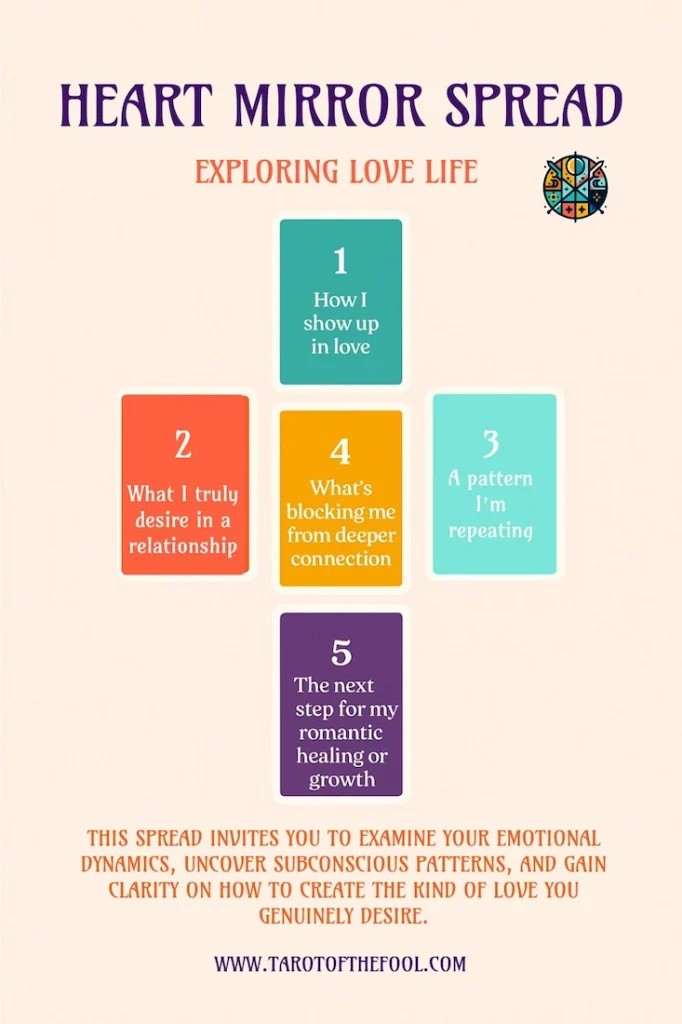
A spread to reflect on your patterns, needs, and desires in love.
Card Positions:
- How I show up in love
- What I truly desire in a relationship
- A pattern I’m repeating
- What’s blocking me from deeper connection
- The next step for my romantic healing or growth
Purpose:
This spread invites you to examine your emotional dynamics, uncover subconscious patterns, and gain clarity on how to create the kind of love you genuinely desire.
2. Family and Friends Dynamics – “Circle of Connection Spread”
Explore the roles, energy flow, and emotional truth in your closest relationships.
Pin it for later! ⤵️
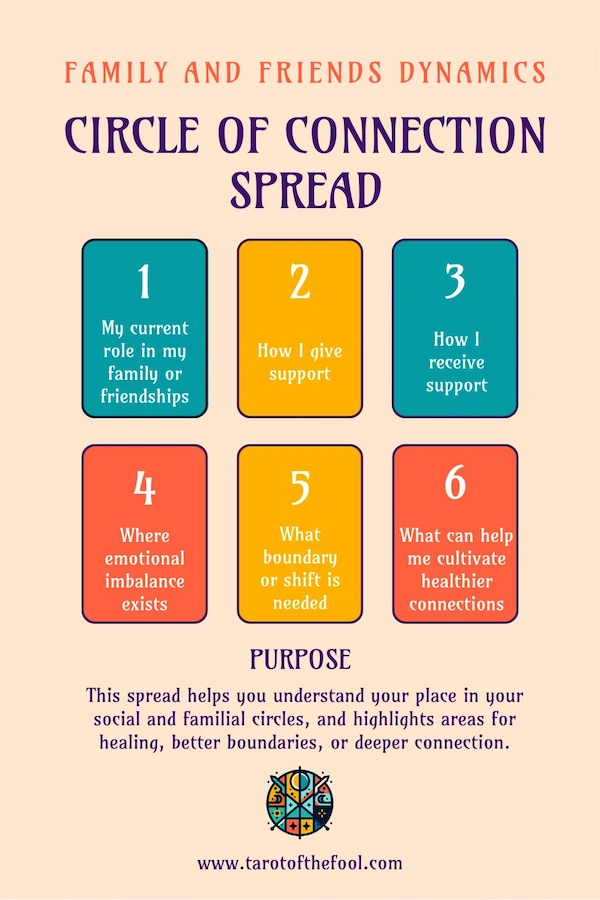
Card Positions:
- My current role in my family or friendships
- How I give support
- How I receive support
- Where emotional imbalance exists
- What boundary or shift is needed
- What can help me cultivate healthier connections
Purpose:
This spread helps you understand your place in your social and familial circles, and highlights areas for healing, better boundaries, or deeper connection.
3. Tackling Difficult Times and Life Challenges – “Resilience Reflection Spread”
A grounding spread to guide you through hardship or uncertainty.
Pin it for later! ⤵️
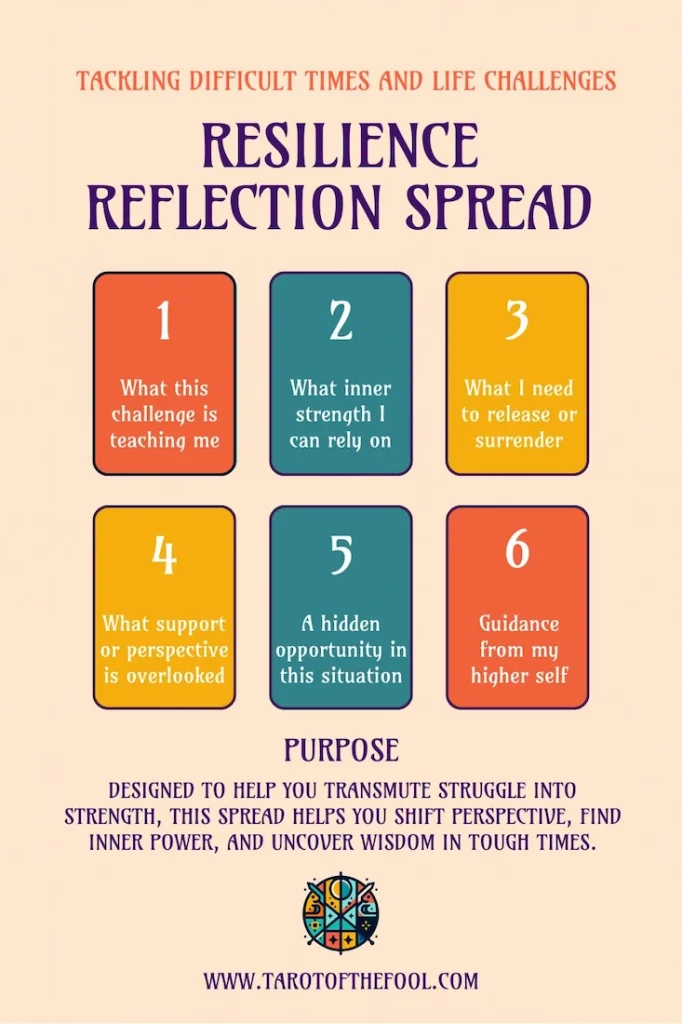
Card Positions:
- What this challenge is teaching me
- What inner strength I can rely on
- What I need to release or surrender
- What support or perspective I’m overlooking
- A hidden opportunity in this situation
- Guidance from my higher self
Purpose:
Designed to help you transmute struggle into strength, this spread helps you shift perspective, find inner power, and uncover wisdom in tough times.
4. Seeking Clarity on the Right Path – “Crossroads Spread”
A powerful spread to illuminate your direction and align you with purpose.
Pin it for later! ⤵️
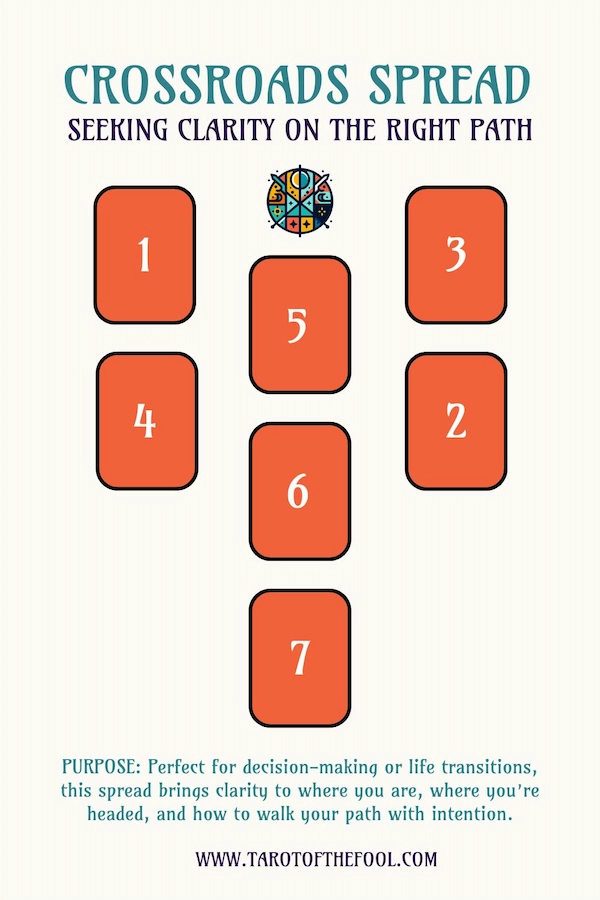
Card Positions:
- Where I stand now
- What’s pulling me forward
- What’s holding me back
- What I’m being called toward
- What I need to let go of
- Advice for navigating the path ahead
- What success or alignment will look like for me
Purpose:
Perfect for decision-making or life transitions, this spread brings clarity to where you are, where you’re headed, and how to walk your path with intention.
5. Connecting with Inner Self – “Sacred Self Spread”
A quiet, intuitive spread for tuning into your inner world.
Pin it for later! ⤵️
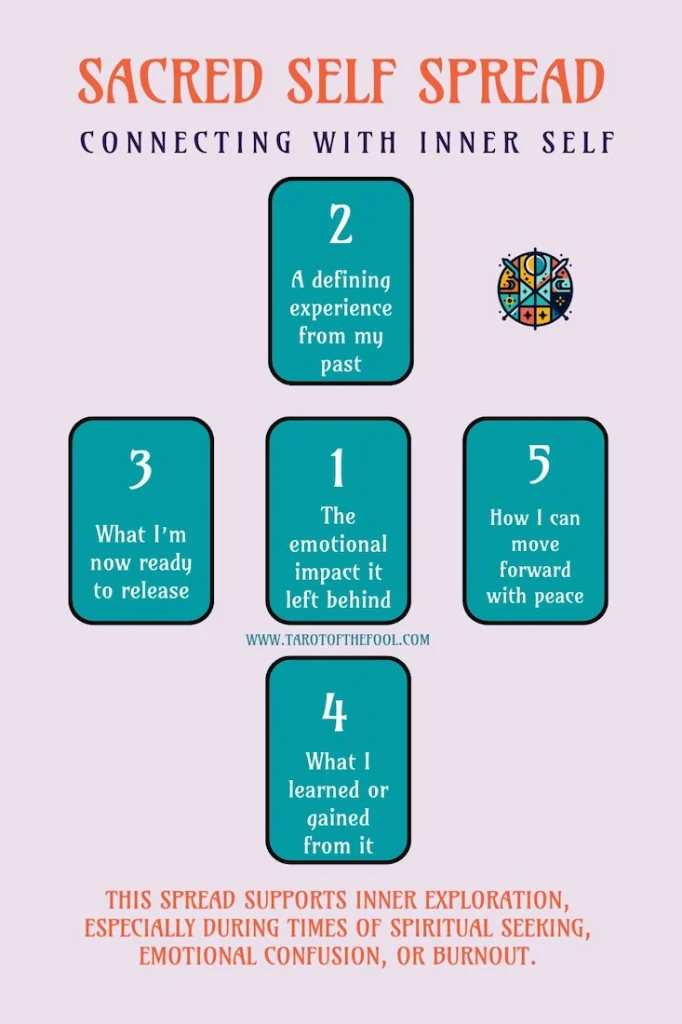
Card Positions:
- Who am I beneath the surface?
- What part of me needs love and attention?
- How can I strengthen my connection to self?
- What truth wants to emerge?
- Message from my inner self or soul
Purpose:
This gentle and nurturing spread supports inner exploration, especially during times of spiritual seeking, emotional confusion, or burnout. Use it when you want to come home to yourself.
6. Learning from Past Experiences – “Healing the Past Spread”
A reflective spread for processing past experiences with compassion and insight.
Pin it for later! ⤵️
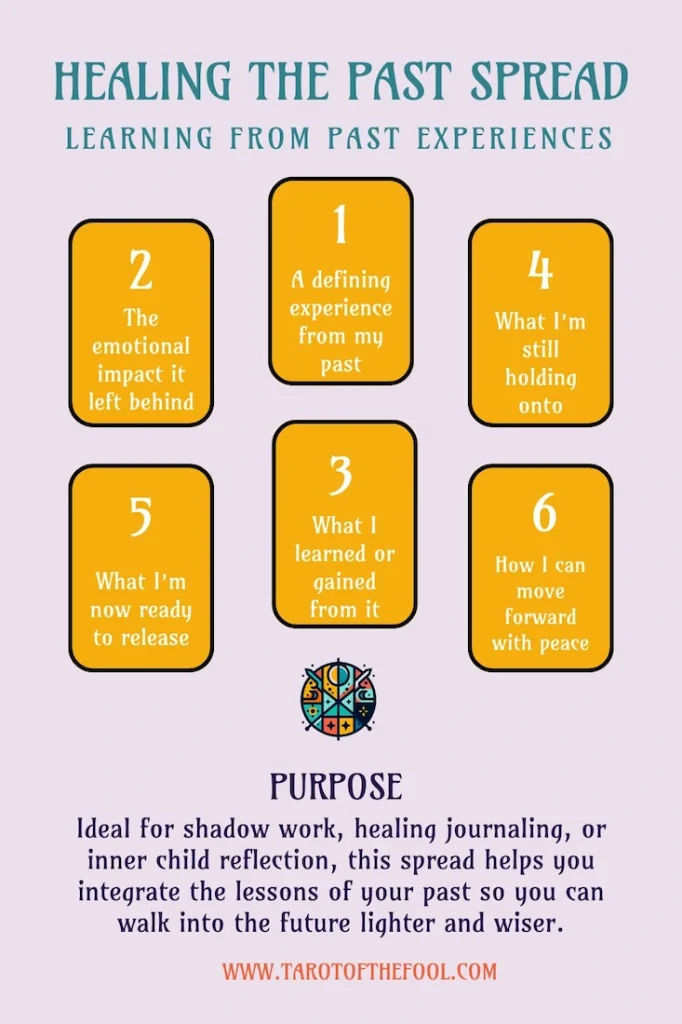
Card Positions:
- A defining experience from my past
- The emotional impact it left behind
- What I learned or gained from it
- What I’m still holding onto
- What I’m now ready to release
- How I can move forward with peace
Purpose:
Ideal for shadow work, healing journaling, or inner child reflection, this spread helps you integrate the lessons of your past so you can walk into the future lighter and wiser.
Interpreting Your Cards
When exploring tarot, understanding both the structure of the deck and tapping into your intuition is key. Familiarize yourself with how the major and minor arcana can shape your interpretation, and learn to derive meaningful insights from the court cards.
Interpreting tarot cards requires both intuition and understanding of symbols. For an accurate reading, take note of themes from both the Minor Arcana cards and Major cards, as each holds a little bit of guidance. A professional reading may offer new insights, but practicing with your own tarot cards can also help you gain confidence in interpretation.
As you reflect on your readings, remember that tarot interpretation is a blend of intuition, symbolism, and personal resonance. The more you connect with your cards over time, the more familiar and meaningful they become. One powerful way to deepen your understanding is by tracking your card pulls consistently – this helps you notice recurring themes, messages, and energetic patterns in your life.
That’s why we created this Monthly Tarot Card Tracker – a simple yet effective tool to help you keep record of the cards you draw and how they show up in your journey. By using the tracker, you’ll start to see which cards appear most often, what situations they’re tied to, and how your relationship with certain cards evolves. It’s a great companion for reflection and growth – and completely free for all our readers.
You can download the current month’s tracker right here and start building your own intuitive tarot archive!
Understanding the Major and Minor Arcana
The Major Arcana consists of 22 cards. These cards represent significant life themes and spiritual lessons. Examples include The Fool, symbolizing new beginnings, and The World, indicating completion.
Each card has a rich tapestry of meanings. It’s about recognizing how these archetypes relate to pivotal life events. The cards ask you to see how these metaphors connect to your own experiences.
The Minor Arcana consists of four suits: Wands, Cups, Swords, and Pentacles. These reflect daily life challenges and interactions. Wands relate to creativity and action, Cups to emotions, Swords to intellect, and Pentacles to material aspects. Understanding these everyday connections can make your interpretations more accurate and personal.
Gathering Intuitive Hits from Court Cards
Court cards often represent people. They can embody personality traits or your roles in various situations. These cards can be either Kings, Queens, Knights, or Pages, each offering unique insights.
To get the best answers from the court cards, focus on their character traits and behaviors. Kings might suggest control or leadership, while Pages could signify new ventures or learning experiences.
Rely on intuitive hits. If a card reminds you of someone or a specific situation, trust that interpretation. This intuitive element often reveals hidden facets of your question. Let your intuition shape the narrative these cards weave, enriching your reading’s depth.
Tarot Experts and Professional Readings
Connecting with a tarot expert or professional reader can provide clarity and depth in your readings. Whether when to seek guidance or exploring insights from TikTok tarot readers, these professionals can enhance your tarot experience.
If you’re seeking deeper insight, consulting a tarot card reader for a professional reading can be invaluable. A lot of people find this helpful when tackling complex situations or confirming their interpretations. Remember, an experienced reader can guide you to ask the best questions and ensure the session points you in the right direction.
When to Consult a Professional Reader
Sometimes, you might feel too close to a situation to interpret your cards clearly. Consulting a professional tarot reader can offer perspective and new insights. They are trained to understand and interpret the cards’ meanings, helping you navigate complex issues or emotional dilemmas.
Seeking a professional becomes valuable when recurring patterns or questions arise without resolution. A tarot expert can break the cycle and offer alternative interpretations or strategies to address stagnant situations. Established professionals often possess years of experience and can provide a nurturing environment for your exploration and growth.
After the Reading
Once your tarot reading session is over, it’s important to reflect on the insights gained and consider the next steps you can take. By examining the messages from the cards, you can develop a plan that leads to positive change and personal growth.
Once your session is complete, take time to reflect on the answers and integrate them into your life. Journal your thoughts, revisit the cards, and explore how they align with your list of questions. The most important thing is to take the guidance into actionable steps, ensuring your tarot journey leads to meaningful self-improvement.
Reflecting on the Reading
After a reading, take time to ponder the information you’ve received. Consider how the cards relate to your current life situation. Ask yourself follow-up questions to deepen your understanding.
For instance, if a card suggested change, think about what that change might look like for you. Reflect on personal experiences connected to the symbols in the cards.
Jot down any thoughts or feelings that emerge. This reflection helps clarify the messages and makes them more personally meaningful. Keeping a tarot journal can be useful for tracking evolving thoughts over time.
Next Steps and Actionable Guidance
Translate the insights from your reading into actionable steps. Consider how you might create tangible goals based on the cards’ guidance. If you received practical advice, think about how to incorporate it into daily life.
For example, if the reading emphasized self-care, plan specific activities that nurture your well-being. If inspiration to pursue a new project arose, outline steps needed to get started.
Focus on manageable actions that encourage progress and foster positive change. This way, your reading becomes a stepping stone toward your goals. Checking in periodically helps assess the effectiveness of the steps you’ve taken.
Get Our Free Tarot Monthly Card Tracker
Keep a detailed record of your Tarot readings with our Tarot Monthly Card Tracker, designed to help you spot patterns and deepen your intuition!
Pin it for later! ⤵️
What Will You Get?
- Monthly Tarot Card Tracker – Perfect for tracking your daily pulls and spotting recurring themes.
- Separate Pages for Major & Minor Arcana – Keep your readings organized with dedicated tracking sheets for both the Major Arcana and Minor Arcana.
- Beautiful & Functional Layout – Easy-to-use design for both beginners and experienced readers.
- Printable & Digital-Friendly – Print and add to your Tarot Journal, or use digitally with your favorite notetaking app!
Improve your Tarot practice with this beautifully designed Tarot Monthly Card Tracker! Whether you’re looking to uncover patterns in your readings or deepen your connection with the cards, this tracker makes it easy to document and reflect on your journey.

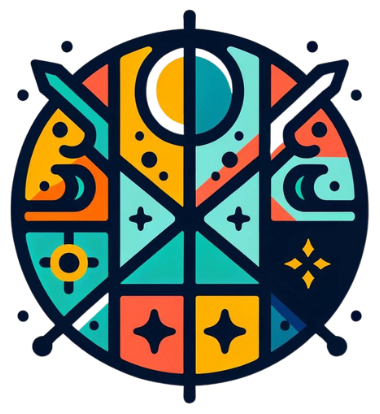

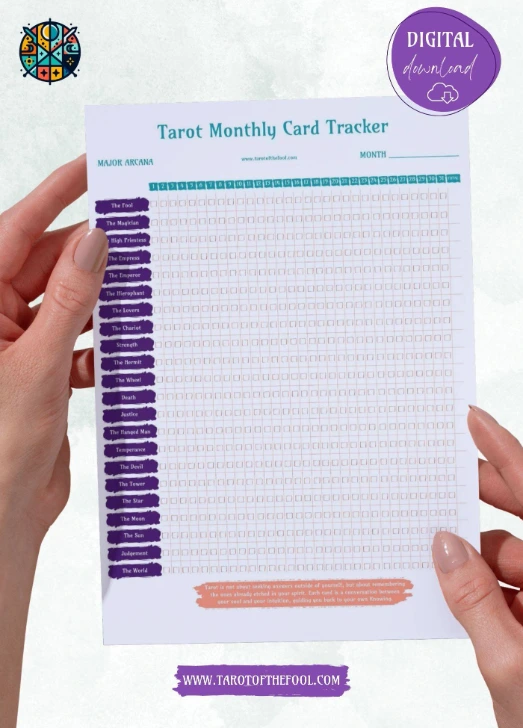
No responses yet